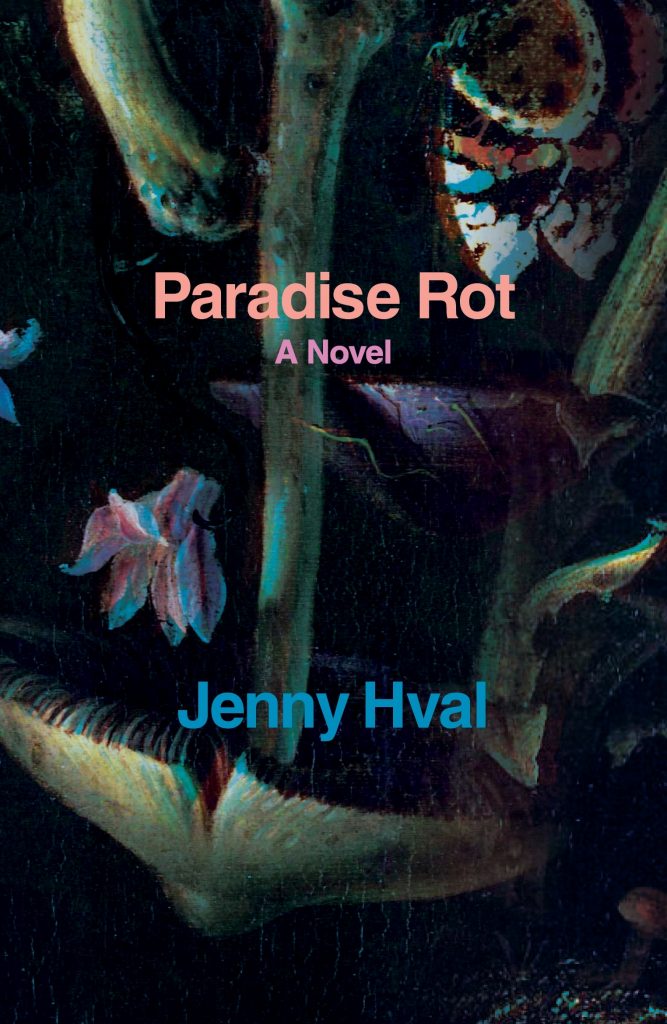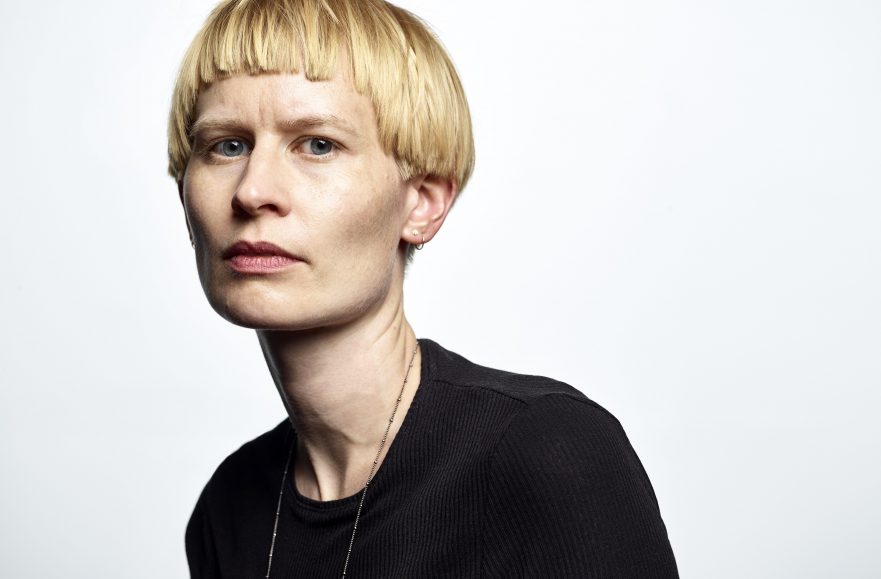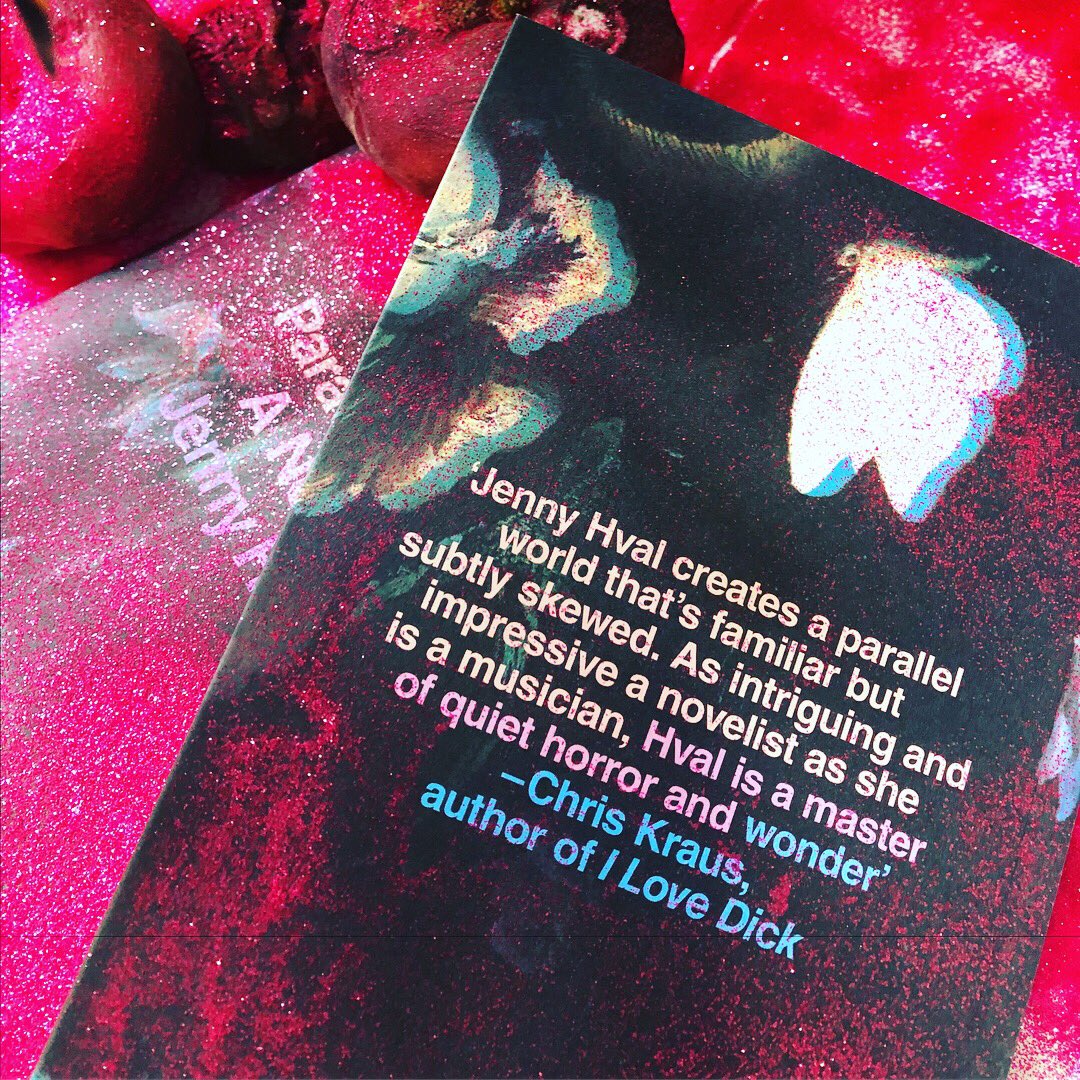By Hannah Hutchings-Georgiou
Paradise Rot is translated by Marjam Idriss and published by Verso, and available in paperback and ebook; both formats are currently discounted on the Verso UK site.

*
I had been staring at the pomegranate for hours, hoping it would answer some elusive question. It didn’t respond, though I had imagined it would, on numerous occasions. In the thick heat of the night, with glimmering red eyes, cat-like but slightly sleepier, the pomegranate would speak, pulsing in its flame-flushed aspect, its tones soft but granular, flesh-slurred, as if speech were an effort; a tongue enunciating with a mouthful of seeds. Today, the pomegranate sat blankly, shrinking into the saucer. No longer communicative in its symbolic suggestiveness, its once red raw fist-of-a-skin loosening into an unappetising pallor, I pushed the fruit – if it could be called that anymore – away from me.
My mother had bought the pomegranate last summer, towards the end of the first lockdown. She was excited by the colour of the fruit, its sheen brighter than an English apple, its size promising more than crumble or pie. I had berated her for buying it, her first purchase after spending months indoors whilst I did the shopping, ran errands, helped neighbours, trying to be mother and daughter at once. ‘We can’t afford such frivolities,’ I reasoned, ‘and remember what happened the last time you brought one into the flat.’ This last allusion was unfair, for it was me who had bought the fruit last time; it was me who had begged my mother to help cut, deseed and turn it into a dish, ready for a party that would leave us with more than red stains on our fingertips and plates (someone had exchanged pomegranate seeds for bugs, leaving our flat infested for 8 months). But she didn’t seem to hear me, so enamoured was my mother by the promise of this rare and luxurious fruit, my whiny remonstrations unwanted background noise to the fragrant whisperings of the well mythologised and mythologizing pomegranate.
Though her fascination remained undimmed, my mother never ate the fruit. Perhaps my scolding words had left her feeling guilty; perhaps its rose-red skin was too beautiful to flay, too perfectly round and taut and smooth to cut into, end from end. For weeks the pomegranate sat, contained in its own solitary perfection, a fruit untasted but desired, distinguished, destined to be enjoyed and savoured by the mouths of our eyes only. Frustrated with work, I would glance over to the kitchen counter, drawn to the compact promise of this fruit, an alert heart silently beating to its own rhythm.
But it didn’t beat of course. And the longer we left it, the later it became to taste the fruit, to use it in the repas of our fantasies. Complacent with our own (in)attentiveness, the pomegranate began to rot. Slowly at first, with a brownish bruise here and a puckering of the skin there, but rot, nonetheless, it did, so that we couldn’t bear to see what her insides looked like: what ripe seeds of flavour had withered and aged and decayed into a darkened cluster of mush. Days, weeks, months and another lockdown passed, and still we held onto this fruit, a morbid core, mouldering from the inside, but still showing signs of life from without. By Christmas I had moved her to a corner of the kitchen, aware of ripe life passing into inedible death. But I still couldn’t throw her away.

Winter’s approach saw the pomegranate in a state of stasis, along with the rest of the UK. No longer envisaging an oracular voice and vision emitting from this unbitten fruit, I began to dream about the furred-over seeds, their black juice crystallising into obsidian, the pomegranate entering a final dark sleep. The fruit’s potential had been arrested; her unrelished innards corrupted without air. A guilty, regretful depression set in; scattered opal, tourmaline, pearl and onyx seeded in the wake of my sleep. I no longer needed to look at the pomegranate to know that the mould lay elsewhere, in and out of sight, inside and outside of me.
It was around this time, during the second lockdown, that I started to reread Jenny Hval’s Paradise Rot. Every morning, before the flat and my mother had woken up, before our surrounding neighbours had stirred and I was reminded of the thin partition separating me from their daily rituals, I sat with her book, tea in hand, savouring the observations of Jo, Hval’s protagonist. To say I had an affinity with Jo would sound gratuitous, indulgent – I had not travelled to a foreign land to study and essentially reconstitute myself in this new “elsewhere”. And still, I instantly recognised her sense of feeling other; of feeling outside of another country, another community, another culture, another language, and therefore being hypersensitive to every passing material detail of which this elsewhere is made. I had felt this hyperawareness creep up and into me throughout this open-ended time of international crisis. I had started to feel the material force and instability of our flat: the walls, the carpets, the furnishings and objects – ugh, too many objects – and my body, in and amongst and of it all. Struggling, then trying, failing, slowly learning to reorient myself in this unhomely home, this damningly domestic ‘elsewhere’, meant being attuned to its mess, its discordant flow of sounds, smells and shadows, its rot and short-lived cleanliness, its patches of damp and stank and non-compostable rankness. It meant being able to lose and find myself in it all again. Yes, I understood Jo’s sense of displacement, her simultaneous sense of loss and gain, despite rarely straying beyond my own front door.
In the novel, Jo’s hypersensitivity only increases when she moves from a musty hostel to an apartment in an old brewery factory. It is here she meets and becomes flat-mates with Carral, her slightly older love interest who we later realise is on the brink of some kind of breakdown. Jo’s desire for Carral is pricked almost instantly, as she takes in the latter’s ‘yellow-white skin’, her ‘yellow curls’, the way a ‘pastel yellow’ sweater pulls over her belly, tightening over her breasts. Jo’s gaze will linger longingly over Carral’s body – even its unattractive waste has a certain attraction – at various moments in the narrative. But it’s not these scenes of queer desire blossoming then closing up again that captivate us the most; it’s not these erotically tinged sights that draw us in, but the spread and growth and humid manifestation of them in and around the spaces of their flat. This psycho-sexual pull between the two women exceeds them; it is of and from and involving their bodies, but also the rapidly morphing body of their strange – estranging? – home. In this sexually and emotionally heightened and amorphous state Jo comes into her own. Just when she stands to lose herself and become indistinct, a sharp sense of selfhood is found – though not before Hval enjoys this gloriously queer blurring of bodies, happenings and homes.

To say the space incubates their desire, ferments its yeasty frothing over, in honour of its brewery origins, would not do Hval’s descriptions or intentions justice. What Jo notes, like the mycologist she’s fast becoming, is the small sproutings of change, the gradual metamorphoses in an already unstable, impermanent, relational point of dwelling. Virtually windowless, with plasterboard walls that barely reach to the floors and past one’s head, this is the spatial equivalent to a scantily-clad body. Hval, ever the musician, even in her prose, layers this open visual and textural domain with an auditory one, so that the sounds and echoes of rain, tears, snoring, falling apples, fabric against skin and the trickling of Carral’s hot piss on the porcelain toilet bowl, are all heard with orchestral resonance. When Carral brings back a plastic bag full of apples, Jo starts to hear ‘apple skin against wood, rolling through the kitchen, back and forth, like eggs ready to hatch.’ It is these apples – ‘Fruitpearls’ as Hval titles a subsequent chapter – when they become too mouldy and odorous for Carral to bear, that signal the rot that has set in and will eventually upend their paradise. Rolling along the floors, indented by Jo’s fingernails and Carral’s bite marks, these apples, the unspoken and unbreached temptation between them, start to saturate Jo’s dreams, teasing, twisting and contorting her body into fructifying wonder in the eye of her unconscious. Like another kind of pomegranate, the awe and repulsion each woman holds the fruit in is proportional to how far they will allow themselves to go in tasting their “forbidden” want for the other. Even when the fruit has been thrown away, resembling ‘jewels in a jewellery box’, their brown juice leaves a sickly, sticky trail that will mark Jo and Carral’s relationship, triggering further leakages of a literal and emotional kind.
Reading about Jo’s almost hallucinatory experience of the brewery and the problematic Carral (whose boundaries are as porous as the flat), provided a strange comfort and affirmation in the destabilising state that is lockdown. Though I had no Carral, no object of love through and with whom I could concentre all my energy, I, like Jo, had myself, a self lost to the environment around me, but mine to regain, reclaim and remake in the light of such rot. Like Jo, I would wake up in the middle of the night, hearing the murmurs of untrodden floorboards, the tilting slates on the roof, the manic laughter of my neighbour on the other side of my bedroom wall. I, too, watched my flat turn into a living organism, one where fuzzy circular nodes sprung up, darkening the grouting around the kitchen sink. A space where webs festooned windowsills and ceiling corners, and the many eyed spiders hung, hungry and watchful for prey. I was in a web of webs, one that spun dead skin cells, filaments of hair, cat fur, wisps of loose thread, bread crumbs, oatmeal, mildew and black mould together, as if the psychic regression and depression taking place inside me was seeping out.
When the pomegranate started to rot, silently, quietly, steadily, a candle wick put out by its own slow burning embers, I realised that I, too, in this time, with all my creative energy, desires and ambitions, had started to moulder; that my inner potential had fallen into wax. It was a collapse of life brought about by being bottled up, locked in, stopped and ‘stoppered’ in the (dis)comfort of my own home. I, like innumerable young womxn the world over, knew how lockdown had snuffed out cold the warm dreams we had previously been nurturing, livelihoods we had been carefully cultivating, watching it all turn to mush. Looking to Hval’s novel, I wanted to see the beauty in it all, the thread of life holding it all together, the brownish stain of the rotting apple leading us outdoors, into light, into spring, into a reinvigorated and reconstituted sense of self. I wanted to know that some new bud would burst forth from all this death and decay and tear-soaked soil. I wanted to believe the promise of the pomegranate would revive again; that the apple was still ripe for the tasting.
I lie on my bedroom floor, my back pressing into it, stroking the tear-soaked carpet. My fingers spy fur and cotton and hair and moths; dirty socks, unwashed cups, piles of books half-read, packets of biscuits half-eaten. I’m surrounded by the day’s remains, by yesterday’s shed skin, and last week’s and last year’s. But this mess doesn’t bother me. From down here I see the sky pour in through the window; a solitary daffodil, amongst the weeds, knocking on the pane. From down here, I appreciate a stain the shape of a pregnant woman seeping and spreading and mirroring my position on the ceiling. From down here, I enjoy a single print made and framed by my mother hanging on the wall. In it, two women, each distinct yet eerily similar, stand beside a tree, its bough tipped down. The older of the two gently shakes its branch, whilst the other, perhaps slightly younger, stands underneath, arms outstretched, mouth wide open, ready to receive the fruit. She is Persephone rising up from the earth, hungry for the fruit of her underworld labours; she is the future self, newly born from the rot of the old. Pomegranate-like in shape and size, the fruit tumbles through the air, aging as it falls, travelling downwards, the weight and fullness of all our knowledge, of all our tired love. Will she catch it, I think, from my floor-bound reverie, will she continue to open her arms wide enough to receive what other women, foremothers, friends, fellow sisters, former selves, so generously share and give? I like to think she will, never hesitating to take the first bite.
